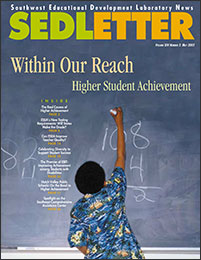Spotlight on the Southeast Comprehensive Assistance Center

Delivering Professional Development and Technical Assistance that Helps Educators Improve Student Learning.
Reading Success Network Helps Increase Reading Achievement
The Reading Success Network is one of the most successful projects of the 15 Comprehensive Assistance Centers across the country. Here is how SECAC and RSN helped one Arkansas school.
SEDL's Southeast Comprehensive Assistance Center (SECAC) focuses on improving learning for all students in the states of Alabama, Arkansas, Louisiana, Mississippi, and Georgia. One of 15 comprehensive technical assistance centers authorized by the U.S. Department of Education under the No Child Left Behind Act of 2001, SECAC works with tribal governments, state education agencies, intermediary education agencies, districts, and schools on issues as diverse as reading, English as a second language, schoolwide planning, and safe and drug-free schools. SECAC has a state team leader for each of the five states who coordinates activities in his or her state, and keeps other SECAC staff members abreast of the educational climate in the state. Much of SECAC's work is tailored to meet the individual needs of the agency, district, or school with which SECAC's staff is working Parkin Elementary had been on the Arkansas distressed school list since the list was started. In 1999, 88 percent of the district's fifth graders scored in the lowest quartile on the Arkansas Comprehensive Testing and Accountability Program (ACTAAP) norm-referenced test.
SECAC introduced Parkin to the Reading Success Network (RSN) process, a collaborative effort by all of the Comprehensive Assistance Centers process used in the Reading Success Network (RSN). RSN supports a teacher's efforts in the classroom through a combination of activities that include peer coaching, the use of reading and assessment tools, and data collection and analysis to inform instruction and determine the most effective intervention strategies. Parkin Principal Becky Gibson believes RSN put the school on the road to improving teacher performance, raising student test scores, and getting the district off the academic distress list.
After two years of participating in RSN, Parkin experienced the highest gain in reading scores in Arkansas for the students in the bottom quartile. And consequently, was removed from the academic distress list in May 2001.
"The networking was the most important thing," said Gibson. "With more access to learning opportunities, the students are better able to measure up to outside standards."
Parkin wasn't the only school that has showed great improvement. Regional RSN evaluations for the 2000-2001 school year showed an increase of 31 percent of second graders reading on or above grade level, and an increase of 35 percent of third graders reading on or above grade level.
Next Article: Credits

